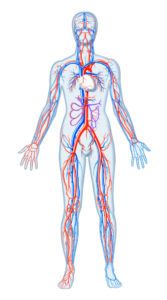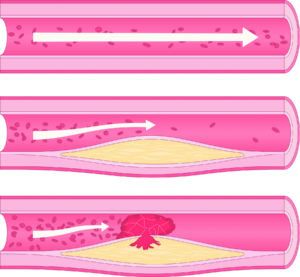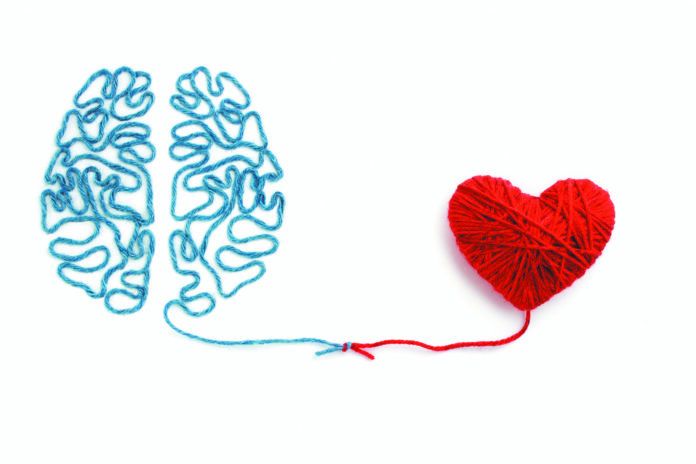We have all forgotten why we walked into a room or had trouble recalling a common word, and the frequency of these lapses almost universally increases with age. On top of this normal cognitive decline of aging are the risk for dementia and stroke. Fortunately, there are concrete steps we can take to help protect our brains. Excess body weight; high blood pressure; disordered cholesterol levels; high triglyceride and blood sugar levels—these factors we typically associate with heart health could be damaging our brains. “The recommendations for maintaining brain health are similar to those for maintaining heart health,” says Tammy Scott, an research assistant professor at the Friedman School and the School of Medicine and a research and clinical neuropsychologist.

Image © JFalcetti | Getty Images
A Clear Connection: The brain clearly needs the heart: without the steady beat pumping blood throughout the body, the brain would not receive the oxygen and nutrients it needs to function. Beyond this very basic dependence, there is a growing understanding of the interconnectedness of these two most essential organs, and how the health of one inevitably impacts the health of the other.
“A clot that has formed in an unhealthy heart or diseased blood vessel can travel to the brain and block essential blood flow, causing a stroke” says Ayan Patel, MD, director of the Cardiovascular Imaging and Hemodynamic Laboratory and the Women’s Heart Center. “On the other hand, damage to the brain (such as from a stroke) has been known to result in changes to the electrical signals in the heart, indicating that neurologic disease can affect autonomic regulation of the heart. It has also been well documented that, in some patients, severe stress can lead to a reversible weakening of the heart muscle (termed stress cardiomyopathy). Thus, there is clear evidence that the health of the heart and brain are interconnected.”
The Vascular System: One of the important aspects of the heart-brain connection is the highway between them. “The vascular system (also referred to as the circulatory system) is made up of the vessels that carry blood and lymph throughout the body,” says Patel. “The cardiovascular system includes the heart, blood, arteries, veins, and capillaries. Arteries carry blood away from the heart to the rest of the body. Veins carry blood back from the body’s organs to the heart. Capillaries are very small vessels between arteries and veins that deliver nutrients to tissues in the body, receive waste substances from those tissues, and facilitate the movement of blood to the veins.”
While the term cardiovascular system is likely familiar, cerebrovascular system may be less so. The cerebrovascular system refers specifically to blood vessels that carry blood to and from the brain. Just as maintaining healthy blood vessels is essential for heart health, it is also a key component in preserving brain health.

Image © wetcake | Getty Images
Plumbing Problems: Like the pipes in your home, blood vessels can get narrower over time and develop clogs. “One of the most common problems that can develop in the arterial vascular system is atherosclerosis, the build-up of plaque in the arteries of the body,” says Patel. “Factors such as smoking, high blood pressure, diabetes, and high cholesterol can all contribute to the development of atherosclerosis. In addition, obesity (especially abdominal obesity) has been increasingly recognized as an important risk factor.”
Arteries must stretch to accommodate the pressure of the blood being pushed out of the heart. This stretching (especially when blood pressure is high), along with chemical assaults from smoking, inflammatory molecules, modified LDL cholesterol, and other factors, can damage the lining of the artery. Damage to the lining of the artery leads to a buildup of cholesterol-laden plaque. Over time, this plaque buildup causes the arteries to become less expandable and can either narrow or completely block them. “Eventually, atherosclerotic plaque in the arteries around the heart can lead to heart attack,” says Patel, “while plaque in the arteries supplying blood to the brain can lead to stroke.”
“Strokes are often obvious and even catastrophic events,” says Scott. “Small vessel disease is more insidious. Like old pipes, small blood vessels often begin to leak with age, damaging the cells right around the leak.” High blood pressure is one of the biggest risk factors for small vessel leakage. Diabetes can also weaken blood vessel walls, increasing risk for leaks. “This leakage, which happens to some degree in almost everyone as they get older, can gradually begin to affect cognitive abilities,” says Scott. “Interestingly, this phenomenon is not typically responsible for memory problems. It is more likely to impact executive function—the ability to organize, plan, and multitask. So someone who always took care of their own finances or was a whiz at organizing the annual family gathering may find they are simply unable to do so.”
Keeping the vascular system healthy is essential to the health of both the heart and the brain.
- MAKE HEALTHY DIETARY CHOICES: replace saturated fats with unsaturated fats; include plenty of fruits, nuts/seeds, vegetables, beans, and whole grains; and avoid foods high in added sugars and refined grains.
- REDUCE SODIUM INTAKE: cut down on processed and restaurant foods, and swap products labeled as reduced or low sodium for higher sodium options.
- WORK TOWARD A HEALTHY WEIGHT: control portions and engage in regular physical activity to work toward achieving or maintaining a healthy body weight
- TALK TO YOUR HEALTHCARE PROVIDER: follow advice and take medications as necessary to keep blood pressure and cholesterol in a normal range and maintain optimal blood sugar levels
- DON’T OVERDO ALCOHOL: If you drink alcohol, keep consumption low to moderate (no more than one drink a day for women and two for men)
- SLEEP WELL: Aim to get at least 7 hours of quality sleep a night
- DE-STRESS: Look for ways to cut back on stress and unwind, such as scheduled downtime, socializing, yoga, meditation, or physical activity
- AVOID TOBACCO PRODUCTS: get help quitting if you need it
Brain Health: Cardiovascular health tends to get more attention than brain health, but there are typically more strokes each year in the United States than heart attacks. In fact, someone in the U.S. has a stroke every 40 seconds, and stroke is a leading cause of death after heart disease.
An estimated 14 percent of people age 71 and older in the U.S. and up to half of all people age 85 and older may have some form of dementia. Dementia is a loss of cognitive and physical functioning that is serious enough to interfere with activities of daily life. When this loss of brain function is due to clogged or leaky blood vessels, it is called vascular dementia. “Vascular dementia is the second most prevalent cause of cognitive decline, after Alzheimer’s dementia” says Scott.
A condition called mild cognitive impairment (MCI) sometimes—but not always—progresses to dementia. (While approximately one to two percent of individuals over age 65 develop dementia each year, this rate is about 10 to 15 percent in patients with MCI). A small clinical study recently published in the Journal of Clinical Neuroscience found the presence of vascular disease—including high blood pressure, high LDL cholesterol, high triglyceride levels, and coronary artery disease—was the most prominent risk factor in the transition from MCI to dementia. About 94 percent of the participants who developed dementia during the six-year study period had two or more vascular risk factors, versus 29 percent of the patients who had not transitioned to dementia by the end of the study.
“The most common cause of dementia is Alzheimer’s disease,” says Scott. Alzheimer’s dementia has its own pathology, involving the buildup of certain proteins in the brain, forming what are referred to as beta-amyloid plaques and tau tangles that are linked to the death of brain cells. “While protecting vascular health does not impact the development of beta-amyloid plaques or tau tangles, there is a lot of overlap between Alzheimer’s disease and cerebrovascular disease,” says Scott. “We tend to see cognitive impairment sooner in people with Alzheimer’s disease who don’t have a healthy vascular system, and the rate of decline will be faster.” An analysis of observational studies published recently in the journal Neurology found healthy lifestyle choices (not smoking, performing 150 minutes per week moderate- or vigorous-intensity physical activity, keeping alcohol consumption light to moderate, performing cognitive activities, and consuming a high-quality dietary pattern) were associated with lower risk of developing Alzheimer’s disease. Engaging in two to three of these healthy lifestyle behaviors was associated with a 37 percent lower risk of Alzheimer’s dementia compared to zero to one. Engaging in four to five healthy lifestyle behaviors was associated with 60 percent lower risk.
“My area of research looks at cerebrovascular risk factors for cognitive decline in aging and dementia,” says Scott. “One thing we’ve notice is that people who have cerebrovascular problems tend to have a greater rate of cognitive decline than those who don’t. Despite years of research, scientists still haven’t been able to come up with either a treatment or cure for Alzheimer’s disease or other types of dementia. It is therefore extremely important to address risk factors for cerebrovascular disease (like atherosclerosis, diabetes, and high blood pressure). This may postpone onset of cognitive decline and slow down the rate of progression.”
What to Do: There are a number of lifestyle choices we can make that address both the development of atherosclerosis and the capillary leakage common in aging. “Avoiding smoking, keeping blood pressure in the normal range, maintaining optimal blood sugar levels, keeping cholesterol levels in the ideal range, maintaining a healthy weight, engaging in regular aerobic activity, and following a healthy dietary pattern are all important steps that can be taken to protect the health of the vascular system,” says Patel. Keeping alcohol consumption moderate, getting adequate sleep, and finding ways to de-stress have also been associated with both cardio- and cerebrovascular health.
























